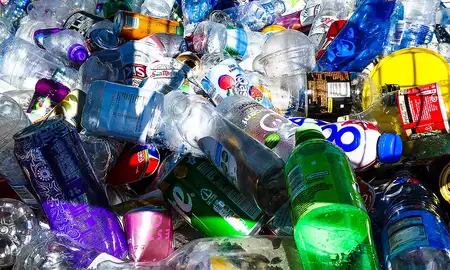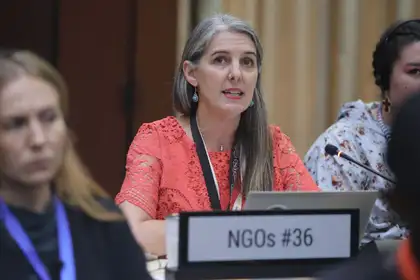
Professor Trisia Farrelly speaks during the third session of the Intergovernmental Negotiating Committee to Develop an International Legally Binding Instrument on Plastic Pollution in 2023. Photo by IISD/ENB | Anastasia Rodopoulou.
A global coalition of scientists is still working to realise a “once in a life-time opportunity” to address the plastics crisis after a stalemate prevented progress during the United Nations (UN) Global Plastics Treaty negotiations in South Korea late last year.
In an article published this week in Cambridge Prisms: Plastics, The Scientists’ Coalition for an Effective Plastics Treaty outlined the reasons for the failure to reach consensus in negotiations. The body of over 400 independent scientists also called for support to continue work that underpins the efforts of the ‘coalition of the willing’ – over 100 United Nations member states who are committed to the establishment of a Treaty.
Professor Trisia Farrelly from Massey University and the Cawthron Institute is the Coordinator of the Scientists' Coalition. She says a clear majority of member states came to the negotiations in Busan in good faith, but their efforts were undermined by a minority of around 30 countries, including powerful petrostates, that are intentionally delaying, derailing and blocking progress.
“It is disappointing, but not surprising, that petrostates and the plastics industry increasingly resist regulations that would require them to take responsibility for the social, economic and environmental costs of business,” Professor Farrelly says.
“Their mis- and disinformation machine has also grown as they attempt to undermine progress toward a treaty.”
She adds that the scientists who attended the negotiations were also disappointed by the lack of transparency and inclusivity in the process.
“The Scientists’ Coalition, along with observers from over 440 organisations attending negotiations, were excluded from many negotiating spaces and plenaries, which is a departure from the norm for UN multilateral agreement negotiations. These processes have generally been inclusive because that is essential to their democratic legitimacy.
“Much of the negotiations occurred in closed room 'informals' - meetings limited to member states and excluding observers including scientists and other civil society representatives and Indigenous rights holders.”
Professor Farrelly says the link between increased plastics production and climate change, biodiversity loss and human rights violations is indisputable.
“The independent science is clear: binding obligations to phase out the most problematic and unnecessary plastic products and the hazardous chemicals present in plastics are needed to end global plastic pollution.”
However, despite the disappointing result in Busan, Professor Farrelly and the Coalition remain optimistic.
“The coalition will continue to volunteer their time and expertise to member state delegations in the lead up to, and on the ground at what is expected to be the final treaty negotiating session this year.”
The Scientists’ Coalition is actively seeking funding to support member states in the establishment and implementation of the future treaty.
“This year, some of our work will be enabled by funding support from the Paul M. Angell Family Foundation, but there is a lot more to do to ensure that we can continue to provide member states with translated, clearly communicated, accurate and trusted independent science.
“Increased financial support from philanthropic organisations is necessary to enable the Coalition to achieve this and we are working hard to attract more funding in the build-up to the next round of negotiations.”
Republished with permission from the Cawthron Institute.
Related news
Academics and alumni receive 2025 New Year Honours
Seventeen Te Kunenga ki Pūrehuroa Massey University academics and alumni have been named in the 2025 New Year Honours List.
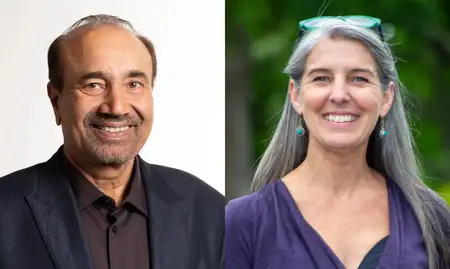
Massey researcher at the centre of efforts to solidify global plastics treaty
Professor Trisia Farrelly has been busy with her work aimed at reducing plastic pollution, publishing articles and attending events across the world that aim to encourage governments to take a hard stance on the issue.
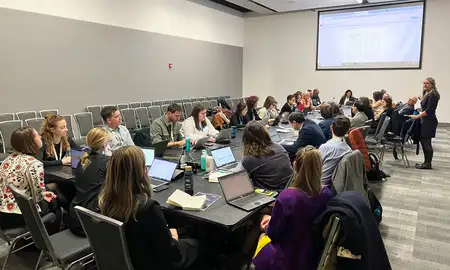
Massey academic presents at workshop to set priorities for international agreement on plastics
School of People, Environment and Planning Associate Professor Trisia Farrelly spoke at the three-day workshop in Suva, Fiji, organised by the Secretariat for the Pacific Regional Environment Programme (SPREP).
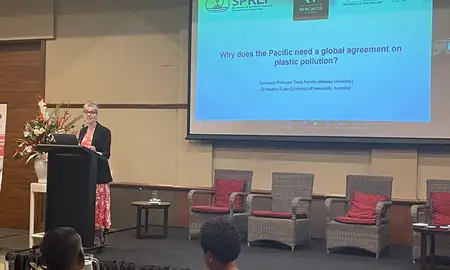
Declaration lays the foundation for global treaty on plastic pollution
Reducing plastic pollution around the globe is something that needs a unified approach in order to bring change, and Associate Professor Trisia Farrelly is at the forefront of this work.
